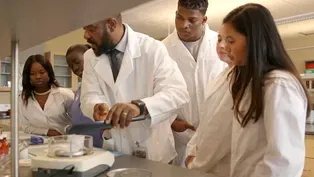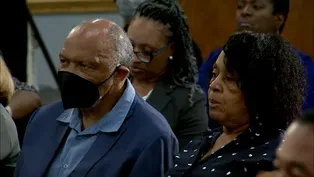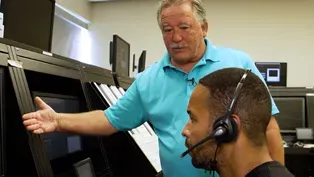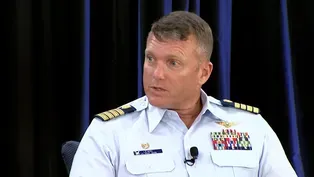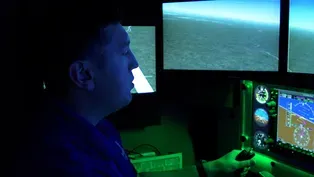
Town Hall: Innovations Leading to Economic Mobility
8/19/2022 | 26m 46sVideo has Closed Captions
ncIMPACT's Anita Brown Graham hosts a town hall at Elizabeth City State University.
Rural communities often struggle with creating economic activity, educational opportunities, and workforce talent. It's forced some NC communities to get creative in creating opportunities for their residents. A ncIMPACT town hall, hosted on the campus of Elizabeth City State University, focuses on how regional partners are coming up with innovations to support economic mobility.
Problems with Closed Captions? Closed Captioning Feedback
Problems with Closed Captions? Closed Captioning Feedback
ncIMPACT is a local public television program presented by PBS NC

Town Hall: Innovations Leading to Economic Mobility
8/19/2022 | 26m 46sVideo has Closed Captions
Rural communities often struggle with creating economic activity, educational opportunities, and workforce talent. It's forced some NC communities to get creative in creating opportunities for their residents. A ncIMPACT town hall, hosted on the campus of Elizabeth City State University, focuses on how regional partners are coming up with innovations to support economic mobility.
Problems with Closed Captions? Closed Captioning Feedback
How to Watch ncIMPACT
ncIMPACT is available to stream on pbs.org and the free PBS App, available on iPhone, Apple TV, Android TV, Android smartphones, Amazon Fire TV, Amazon Fire Tablet, Roku, Samsung Smart TV, and Vizio.
Providing Support for PBS.org
Learn Moreabout PBS online sponsorship- [Narrator 1] ncIMPACT is a PBS North Carolina production in association with the University of North Carolina School of Government.
Funding for ncIMPACT is made possible by... - [Narrator 2] Changing the course of people's lives, that's the impact UNC Health and the UNC School of Medicine work to deliver every day.
Our 40,000 team members across the state of North Carolina are committed to caring for you, our patients and communities, as well as educating the next generation of healthcare professionals.
Individually, we can do a little, but collectively, we can do a lot to create impact.
- Thank you to Chancellor Dixon, for hosting us, and to all of you.
I don't have any doubt that we're gonna have a great conversation amongst the panelists, and with you, and we're gonna showcase to the rest of North Carolina what makes this region so pretty special.
[audience claps] Communities can sometimes struggle to build strong local workforce pipelines, but the Albemarle region of North Carolina is determined to prepare students for high-demand field jobs.
ncIMPACT's Evan Howell visits Elizabeth City State University, and gives us a look at some of the innovative degree programs there.
- The aircraft's doing what we wanted it to do, right?
We wanted it to go... - [Evan] Alex Domingue's interest in flying started when he watched his dad work on fighter jets at an Air Force base outside Goldsboro.
- I tried to do computer programming couldn't learn that language very well, so I decided to give a shot at flying.
Gonna keep the aircraft a level at the horizon, and as I start to bank more and more and more, it requires a little more back pressure- - [Evan] He's now a fourth-year student in the Department of Aviation Science at Elizabeth City State University.
It's a program designed to prepare students for high-demand fields by offering a wide array of certifications required for work in the aviation industry.
- So I think it's a good... That's what was the most appealing process to me, is I had a pathway that I could follow to be able to get to my end goal of going to the airlines.
- [Evan] The program is the only one of its kind in North Carolina, offering tracks that include air traffic control, management, and drone operations, but also meets an industry demand for people to think outside the box.
- See, we work on crew resource management, how to deal with others, how to handle issues in the cockpit, because you have to be able to do problem solving, as well as have the hand-eye coordination skills to be able to fly the aircraft itself.
- And one of the application that- - [Evan] Kuldeep Rawat says what is unique about the program is that it meets the immediate demand of a quickly evolving industry.
He says there's strong partnerships with commercial aviation and the Coast Guard helps students get jobs after graduation and benefits the region.
- The inventory that we have here, coupled with the simulation systems that we have here, it makes our program very attractive to students who are trying to get into the industry, because they need to learn on these drones, the real drones, not on the drone that is $500 drone.
These are some expensive drones that are used by the industry.
- So that may be one of our aircraft coming in this way.
- [Evan] Rawat says a key way to solving the nation's pilot shortage is to attract more students from underserved populations and support them through commercial partnerships.
- The African Americans, women, Hispanics represent less than 4% in the aviation industry.
We have to increase that to fill that demand and skill gather is required for sustaining the aviation workforce.
- I can put this aircraft in a stall and it will tell you if you crash.
- For Domingue, he says the program has grown from four aircraft when he started to 11 today, and he encourages others to take a look at aviation as a future proof career choice.
- Aviation's a pretty cool industry to get into.
It gives you a lot of freedom.
It allows you to see the world from a different perspective.
- I am really pleased to be joined for this first panel by Dr. Evonne Carter, the Vice President at the College of The Albemarle Captain Chip Lewin, Commanding Officer US Coast Guard Air Station Elizabeth City, and Dr. Kuldeep Rawat, the Dean of the School of Science, Aviation, Health, and Technology.
I'm exhausted just thinking about all those programs.
So we saw in the package, some insight into what's happening here in this region, but I'd like to start with you and I'm gonna call you Chip because to say Captain would feel as though as privileging you over everybody else on the stage.
How about that?
- That's perfect.
- 'Cause you're not the boss of this stage, I am.
- [Chip] Not at all.
- Okay.
Good.
[audience laughs] So Chip, give us some sense when you think about, from your really interesting perspective, what are the employment sectors here that are high demand and move economic mobility?
What would you have on the first five fingers?
- Well, I think there's a lot, so hard to narrow it down to five, but we look at healthcare, we look at education, military is one of them, advanced manufacturing.
I mean, there's a lot here.
There's a lot of opportunity in the area.
From my perspective as the coast guard, we see military and aviation as a big one, both in civilian and active duty roles that provide both economic and social mobility.
But there are a lot in here.
We still have hospitality, healthcare and agriculture and a few of those.
But I think the biggest ones with a lot of growing potential are probably the original ones I chatted about.
- So workforce is about supply and demand and if there is the opportunity, that is the supply.
Talk to us a bit, Kuldeep, about how are you creating future employees for these industry sectors?
- Sure.
As Chip mentioned the top five areas, but here at ECSU, Elizabeth City State University, we are offering wide variety of programs from computer science to technology, from aviation science to health related programs.
But one of the programs that we keep hearing about, one of the sector that we keep hearing about a demand or shortage of workforce is aviation.
And here at ECSU, we're offering four-year aviation degree program in the State of Northland, only one in the state of North Carolina.
- [Anita] Say that again.
Show off, it's okay to show off a little bit.
[audience laughs] - We're offering states only four-year aviation science degree program.
And we are making sure that we are providing students with quality training leading to the FA certifications, which is really mandatory to get into these aviation jobs.
On top of that, we are also making sure that we can connect our students with people like Chip here, who is from the military aviation or people also from the civil aviation background so that they can be mentored by them.
And also we reach out our partnership to give them internship opportunities.
We also wanna make sure that our program meets industry standards.
So we seek our third party validation.
We are not saying we are great, okay?
We reach out to third party organizations that are validating our program.
- Wait, wait, just say that again.
So you reach out to them.
You don't have to say you're great because they say you're great?
- That's right.
That's right.
- Just so that everybody in the state is clear.
- So we recently received accreditation for aviation science program from Aviation Accreditation Board International.
And we are only one of the 42 institutions worldwide to receive such a recognition.
And the best part of all this is that we are able to provide training for the future aviator, for future pilots in cost that is less than half of what it would cost to go out and get the same training.
So because we wanna make sure that the cost doesn't become the barrier to entry into these highly specialized and high paying jobs.
- I'm thinking I might want a career change here.
- We can make that happen.
[audience laughs] [audience claps] - So Evonne, we've been talking about economic mobility.
We've been talking about the kinds of jobs and industry sectors that are available in this region and the way the university is preparing residents for those jobs.
Let's expand our perspective out a little bit.
Talk to me about what this means for the economic mobility of people who live here.
- Well, thank you.
The community college system in North Carolina has 58 colleges and College of the Albemarle is one of them in the Northeast region.
And our mission is to ensure the economic development of the area.
And so if we have a program that we want to start, that there's a need in the community, in one of the industries, we have to ensure that the graduates and the completers will be able to get a job and that job will be sustained.
And so we have probably 30 programs that we offer at College of The Albemarle and probably I'm gonna just venture to say that our healthcare programs have been very, very successful.
- In terms of economic mobility?
- Exactly.
And so we have, for instance, our nursing program, which is our flagship program I'll say, it's one of our bigger programs.
We have probably 50 students starting every year wanting to be nurses in this two year program.
And they have a fabulous program.
They are very well trained and they are so needed in our healthcare facilities, not just our hospitals, but also doctor's offices and nursing homes.
So the healthcare students who complete end up with a fabulous job with a really well paying salary.
And so that's just one of them.
We also have people in welding and machining and aviation repair, every single area has a pathway for jobs.
So we do work based learning.
So students are familiar with the local industries and businesses, so that get to know them, people from business and industries sit on our advisory committees.
So we have a really good two-way path for communication of what they need and what we can provide them.
- Wow.
Chip, you talked a little bit about your articulation agreements with Elizabeth City State, but how are you reaching further into the pipeline?
How do you get kids who aren't even thinking about gracing a college campus?
- Yeah, it's challenging.
We had a few programs and one of 'em is the coast guard has started a junior reserve officer training program, summer called Junior Leadership Program.
There're already four of them in a country.
There's two more about to start.
One of 'em is right here in Camden county.
It's a very mature one, sent three kids to the Coast Guard Academy this year down in [indistinct] to start another one.
A big grassroots one.
We kind of integrate, our families integrate into the communities, our members come in.
We were just talking, I heard referred to, we bring a lot of middle management in.
So we have people that come in and join boards.
They coach, become teachers and our kids are in school together.
So some of it's a grassroot spread.
It's one of the reasons why Elizabeth city is one of the 23 coast guard cities in the United States, three other cities are in North Carolina.
And then the partnerships, making partnerships with the elementary schools to partnership and education, making partnerships with the universities and the community colleges are kind of critical because our recruiting staff, Coast Guard wide recruiting is not very deep.
So we all kind of do it in among ourselves and it comes down to a lot of local partnerships, local teamwork, and trying to just spread the news about opportunities here and how we can help each other, lift each other up.
And some of the potentials is honestly unlimited.
We just have to communicate it a little bit.
- How scalable do you all see these educational attainment pathways to mobility being?
It's a hard question, but do you expect to see the overall income rising over time?
Do you expect to see poverty rates decreasing?
If all of this is working for as many people as it might work for, what can we expect to see as indicators?
- That's a great question.
And I think that as industries come and look at Elizabeth's city and say, "Oh, they have all these great opportunities for training and for support.
And people really are trying to get higher degree and credentials.
We do wanna use that workforce.
And I think that that's something that we need to keep communicating.
And even though it may not be scalable, that you can see right now, you building these people, these seeds in the community to really expand.
And I think that the more role models we have in some of these high tech programs, I think the further we will go.
- Thank you all.
Give them another round of applause, please.
[audience claps] In this segment of our town hall, we're gonna spend some time looking at the kinds of supports that are necessary for students to be successful.
ncIMPACT David Hurst visits a program at Elizabeth City State University.
Take a look.
- [David] The first year at a new school can be challenging.
That's why Makayla Hathaway wanted to go somewhere she feels supported.
- I wanted to come here 'cause it's a small community, small-knit campus.
And for the social work program.
- [David] While she specifically came to ECSU for the social work program, it was the Sister2Sister program where she found the support she was looking for.
- It just brings us together into a sisterhood to where we can cooperate academically, emotionally.
- [David] The Sister2Sister program launched in January of 2020.
It helps first-year students at ECSU build meaningful relationships with campus and community members.
University leaders launch the program after seeing the success of the male equivalent Champion Scholars program.
Both programs partner with local community leaders and business professionals who come to speak with the students on subjects, such as career development.
- It helps me because I've met with people that will help me with my development in music and my development in education as well.
They gave me advice on how to maybe handle students and handle people that actually need help in the community.
- Hey Kevin, could you gimme some information on- - [David] Gary Brown is the Vice Chancellor for student affairs at ECSU.
He says these programs help enhance educational achievement and cultural engagement for minority men and women within the region.
He says the programs have improved the graduation and retention rates for participating students.
- As we think about how do we support our students holistically from a mental health and wellness perspective, from a student engagement perspective, from a student success perspective, which ultimately is what it is we're here for, student success, the outcome, a student graduating from the institution, going out into their local community, making an investment in that community.
So that then that community's economy rises to a level.
- Technically my second year- - [David] For Makayla Hathaway, the Sister2Sister program gives her the support system to do well in school and helps her move towards her dream of getting her masters at UNC Chapel Hill.
- That we help each other out.
We give each other advice, whether it be on a paper that we have coming up or just a simple speech that we have to give during class, and we just simply come together and we assist each other on how we can get it done.
- Excited to be joined for the second panel by Brandi Bragg, who's with the Northeast North Carolina Career Pathways where she serves as a facilitator, Dr. Gary Brown, who is the Vice Chancellor of Student Affairs here at Elizabeth City State University, and Lenora Jarvis-Mackey, the Executive Director of the River City Community Development Corporation.
Thank you to all three of you for being with us.
Gary, I can't wait to have Makayla join us at UNC Chapel Hill.
So thank you for all the good stuff you're doing.
It would be nice for us to believe the equation to student success was simply going to an institution of post-secondary educational attainment and working very hard, but we all know it's not that simple.
So talk to us a little bit of the kinds of support services that students often show up needing.
- Absolutely.
So I think in general, when people think about higher education, they think about it from just an academic perspective.
And certainly that is kind of the outcome that we're trying to get students to is how successful are they in a classroom to earn the degree or the credential so that then they might be successful once they leave the institution.
But our commitment here at Elizabeth City State University is one that goes back even to our founding.
We're a place it provides opportunity.
And in order for us to make good on the opportunity, it requires us to look at our students holistically and think about what needs actually exist.
And so anything that you could potentially speak of or think of, we are offering here at the institution.
So as it relates to mental health and wellbeing, we have a strong focus on that have grown, our counseling support services and our partnerships to even offer telepsychiatry support for students who might present with mental health concerns.
We have a very vibrant kind of student engagement approach to the work that we do that is designed to develop them to relate to each other, right?
So it speaks to these issues of diversity and equity and inclusion similar to what MaKayla referenced.
Those programs, Champion Scholars and Sister2Sister, are really designed to develop a sense of community and we find different pockets of community within ECSU.
- Thank you.
So Brandi, we've heard about a number of potential barriers that students may face.
Talk to me a little bit about how, as a region, you all are collaborating to try to address some of those barriers.
- Absolutely.
So actually led by Elizabeth City State University.
We have a group working in three counties here in the Northeast, Pasquotank, Washington, and Tyrrell called Empower NENC.
And it's through My Future NENC, it's a local education attainment collaborative.
So we're looking for people to attain credentials, but we also recognize working in this group that there are a lot of barriers.
And so some of the things that we're looking at are how can we help to address those really focusing specifically on those three counties, even though we know it's a need across the entire Northeast.
So we've started this with communication, right?
'Cause we understand that a lot of people just aren't aware of what is available in our region.
So that's where we began.
We have a website that's up and we're working on passing information out through our partners to specifically groups that are underrepresented in our educational areas.
So it's been a really great process and we've still got a long way to go.
And I'm happy to say that all of the people on this panel are part of this and Dr. Carter from the previous panel as well.
- That's wonderful.
And in full transparency, the ncIMPACT initiative has been working with this group.
So many of the things I heard, Lenora, housing, food insecurity, social development are things that nonprofit organizations, particularly those in comprehensive community development have been doing for some time.
So talk to me about how a nonprofit organization leans into this kind of community collaboration.
What do you bring to the table?
- Thank you, Anita.
I think that the nonprofits in Elizabeth City and the surrounding areas bring quite a bit to this conversation and to this region because I know that having been in the nonprofit sector for going on 33 years now that without the work that the nonprofits do and what we bring to the table, we would really be suffering as a community.
What we need as a nonprofit is to get more involvement from the community and from our local government in terms of engagement.
And I think once we have that, at least a good beginning, a good start, the work that we do would be much more significant.
I always say that it's about education, as Brandi has said, that people really understand the significance of nonprofits, because what we know is the work that we provide, housing, food insecurities, working with the homeless, working with young people that have lost away is that without that, and without the support of local government in our community, then the resources that we need are not there.
And so if we can form those collaboratives and get those entities involved, I think that we could do even more.
- Absolutely.
Thank you.
Yes, sir.
- Hello.
We've heard a lot about some great opportunity throughout both presentations so far, and you actually just started to allude to my question, which is how do we ensure that our students, as well as community understand all these different opportunities?
'Cause as a parent myself, I know some of my kids and my myself just had no clue about what options were available.
And if you could maybe give some examples of that, that'd be great.
- Okay.
So I'm gonna give each of you an opportunity to just talk about awareness.
How do you make sure that the public knows what's available right around the corner?
- That's the hard part, right?
I mean, we've got all this great stuff out here, but not everybody knows.
So one of the things we've really worked on in this region through our collaboration is sharing information on social media 'cause it's free, so nobody can tell us we can't spend money on it.
And then actually getting out into the community to talk about what we're doing, but it's a slow process.
There's a lot of mindsets that need to change about what the world of work is and what's available.
So just building on that awareness, I actually got Dr. Brown a little earlier when he was in makeup, I took a picture of him for Twitter.
- Now all his friends know he was in makeup.
- That's right.
- You should not have done that, Brandi.
- He looks great.
But yeah, so getting the word out there that we are doing these things is what's really important so people can grasp onto it.
- Love it.
- So I also think it is the continued collaboration between all of the entities that you've seen today.
I think if we all kind of band together, then we all can be equally successful across this region.
And I think there are also some programs that we have that are available to us, that help to get the word out about the opportunities that exist, TRIO programs in particular, which are funded by the federal government and are housed at many times at community colleges and also certainly we have several of those programs here at ECSU and their focus- - Those programs are for whom?
- They are for underserved communities, generally minority.
And for us we have four programs on our campus that are TRIO focused and they help to ensure that families and students understand what it takes to get into to college.
Some programs even walk them through the process of helping them to apply and to do the research related to financial aid and those sort of things.
And so I think the more we can continue to push those programs and ensure that that information is shared amongst all of us and the more successful we'll be.
[upbeat music] ♪ - [Narrator 1] ncIMPACT is a PBS North Carolina production in association with the University of North Carolina School of Government.
Funding for ncIMPACT is made possible by- - [Narrator 2] Changing the course of people's lives, that's the impact UNC health and the UNC School of Medicine work to deliver every day.
Our 40,000 team members across the state of North Carolina are committed to caring for you, our patients and communities, as well as educating the next generation of healthcare professionals.
Individually, we can do a little, but collectively we can do a lot to create impact.
ECSU boosts economic mobility through student support
Video has Closed Captions
Clip: 8/19/2022 | 2m 25s | ncIMPACT explores two student support services at ECSU that are making an impact. (2m 25s)
How regional partnerships can support students for success
Video has Closed Captions
Clip: 8/19/2022 | 26m 43s | Panelists join Anita Brown-Graham to discuss student support services. (26m 43s)
Innovative programs prepare students for high demand jobs
Video has Closed Captions
Clip: 8/19/2022 | 2m 28s | ncIMPACT features some innovative degree programs at ECSU. (2m 28s)
Regional solutions to prepare students for high demand jobs
Video has Closed Captions
Clip: 8/19/2022 | 29m 39s | Panelists join Anita Brown-Graham to discuss collaborations benefiting the region. (29m 39s)
Town Hall Preview: Innovations Leading to Economic Mobility
Video has Closed Captions
Preview: 8/19/2022 | 20s | ncIMPACT's Anita Brown Graham hosts a town hall at Elizabeth City State University. (20s)
Providing Support for PBS.org
Learn Moreabout PBS online sponsorshipSupport for PBS provided by:
ncIMPACT is a local public television program presented by PBS NC
